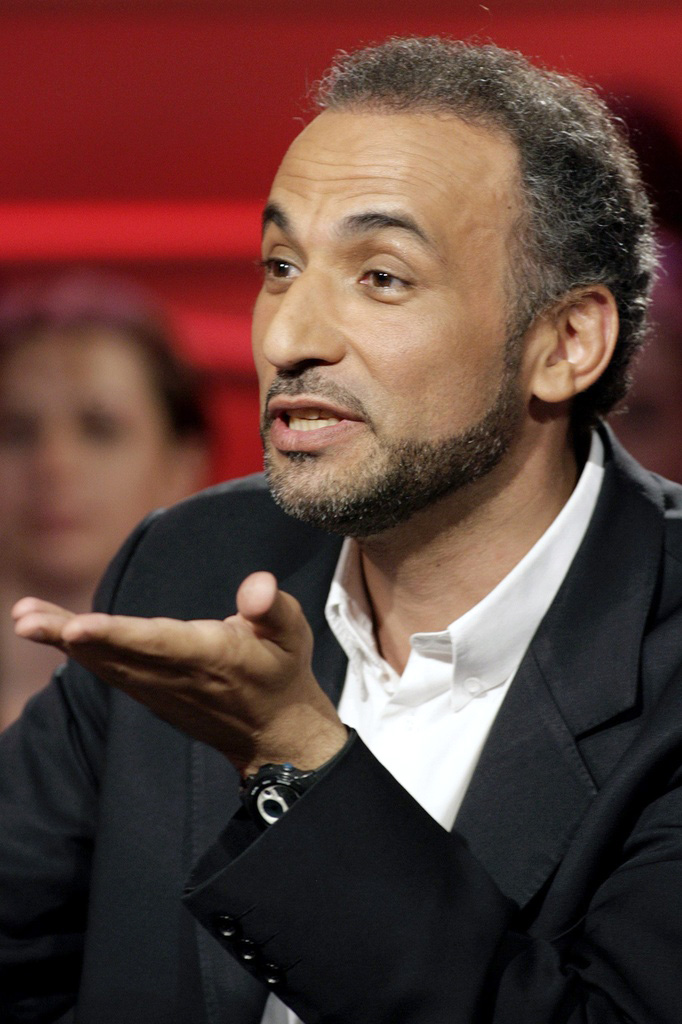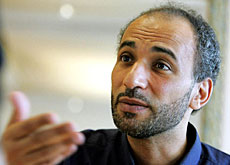Ramadan pleased as Washington clears his name

Swiss Muslim scholar Tariq Ramadan has expressed relief after the United States lifted his six-year visa ban, effectively clearing him of alleged terrorism links.
He is now looking forward to travelling to the US to contribute to academic debate on American policies, he tells swissinfo.ch.
The US barred Ramadan entry over money he donated to the Swiss-based Association de Secours Palestinien, a charitable group Washington says supported terrorism and contributed funds to the Islamic movement Hamas.
In a turnaround this week Secretary of State Hillary Rodham Clinton signed orders enabling the re-entry of Ramadan and another scholar, Adam Habib of the University of Johannesburg, once they obtain the required admittance documents.
“Both the president and the secretary of state have made it clear that the US government is pursuing a new relationship with Muslim communities based on mutual interest and mutual respect,” State Department spokesman Darby Holladay said on Wednesday.
Both professors, who are frequently invited to the US to lecture, were critics of the war in Iraq.
swissinfo.ch: First of all, how do you feel about the decision by the US to lift your visa ban?
Tariq Ramadan: I am very happy. I knew from the very beginning that the reason for it – anything that had to do firstly with the [US] Patriot Act and then with the money – was not the central issue. This was mainly about my stance on the Iraqi war and some of the American policies. I said that from the very beginning.
I am very happy … to see that what was said by President Barack Obama is now trying to be applied when it comes to opening up with the Muslim world and trying to open this critical debate that we need. As was said by the spokesman for the State Department yesterday, I am part of the process. I am part of this critical discussion as a westerner, but also as a European and a Muslim.
It is important for me because after six years it clears my name of anything that was said about me.
swissinfo.ch: Do you feel the US was trying to make a big gesture towards the Muslim community in doing this?
T.R.: I don’t know if it’s a big gesture. A gesture, yes. [After the Christmas Day 2009 failed terrorist attack over Detroit] President Barack Obama said Muslims are part of the solution and they should be part of the whole process when it comes to tackling extremism and violent extremism. It is what the State Department spokesman said yesterday when he said we need to open up with Muslims and we need to have dialogue and discussion. So I think it is a step forward and I think this is important.
I remain, of course, critical of American policy. My criticisms are not blind criticisms. I want to be involved in constructive criticism and I want also to be able to go back there and have discussions and dialogue with scholars, intellectuals, within academia.
swissinfo.ch: What do you think the ban, and the argument behind it, said about American policies at the time?
T.R.: At least that period of time where suspicion was everywhere and fear was everywhere, seems to be over. We know that with what happened recently [with the Christmas Day 2009 attempted terrorist attack] that there are security measures to be taken but at the same time what we get from the current Obama administration is that they are trying to differentiate between critical discussion with Muslims open to dialogue and a tiny minority of violent extremists.
This is the starting point. And then we need to understand that there is no future if we ban people from speaking out.
swissinfo.ch: The State Department said Obama was seeking “mutual interest and mutual respect” with Muslim communities. Do you think US relations with the Muslim world have improved under his watch? Is there a long way to go?
T.R.: I think that from the very beginning with his election relationships improved, per se. In essence his election was an improvement. And then his discourses, the speech he gave in Cairo on June 4th, his tone and the way he is talking about Islam, this has completely changed perceptions.
Now, something which is critical is that he has talked a lot and said a lot of things … He himself said after he got the Nobel Prize that he still has to achieve things and to translate this into action.
swissinfo.ch: Guantanamo is still one of Obama’s bugbears. Do you think he is a long way from resolving this?
T.R.: Yes because it is much more complex that he thought. When you have one terrorist attempt like we had in this aircraft [over Detroit], you can see that it is going to be very difficult. Because he is surrounded by people who just want to say that his policies are naive and that he does not understand the level or nature of the threat.
It is a step-by-step strategy but I still think that he can go faster in some of these dimensions because Guantanamo is really a dark hole in the whole thing. We really have to stop that.
swissinfo.ch: One of the main arguments in your latest book, What I Believe, is that one can be both a citizen of the west and a Muslim without it being a conflict – what is key to achieving this?
T.R.: First we have to understand that we have multiple identities and there is nothing wrong with this. It is more about speaking about the common values and principles that we have than about conflicting perceptions.
Jessica Dacey, swissinfo.ch
Ramadan holds an MA in philosophy and French literature and a PhD in Arabic and Islamic studies from Geneva University.
He is professor of Contemporary Islamic Studies at Oxford University and teaches at the Faculty of Theology at Oxford University.
He is a senior research fellow at Doshisha University in Japan and president of the Brussels-based think tank European Muslim Network.
He has published more than 20 books on Islam.
Tariq Ramadan was born in Geneva in 1962. He is married with four children.
He is the grandson of Hassan-al Banna, who founded the prominent Islamic movement, the Muslim Brotherhood, in 1928.
His father, Said Ramadan, fled Egypt due to the persecution of that organisation and settled in Switzerland.
Ramadan, who lives in London, says he is trying “to build bridges between two worlds that don’t know each other very well”.
In 2004 he was barred by the US government from taking up a post at Notre Dame University in Indiana.
In January 2006 the American Civil Liberties Union (ACLU) filed a suit against then Secretary of Homeland Security Michael Chertoff and Secretary of State Condoleezza Rice for denying visas to foreign scholars, including Ramadan.
The ACLU accused the Bush government of manipulating the Patriot Act.
Ramadan has said he opposes the US invasion of Iraq and sympathises with the resistance there and in the Palestinian Territories.
He has condemned Islamic violence, has no connections to terrorism and promotes peaceful solutions but he has been dogged by allegations that he is an extremist despite his public pronouncements.

In compliance with the JTI standards
More: SWI swissinfo.ch certified by the Journalism Trust Initiative











You can find an overview of ongoing debates with our journalists here . Please join us!
If you want to start a conversation about a topic raised in this article or want to report factual errors, email us at english@swissinfo.ch.